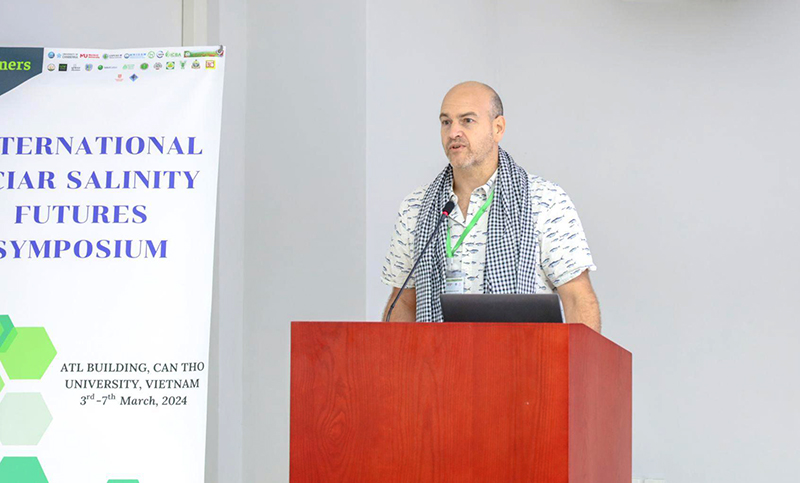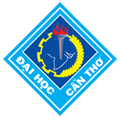Saltwater intrusion is a major challenge affecting the sustainable development of natural resources. Recently, saltwater intrusion has become increasingly common and complex, affecting land and water resources in many countries, including Vietnam, especially the Mekong Delta region. It significantly impacts the soil environment and puts pressure on freshwater supply, and national food security. Besides agriculture, saltwater intrusion can impact the fisheries sector and lead to a decrease in biodiversity. The causes of this issue are due to climate change phenomena such as droughts, floods, sea level rise, and subjective reasons caused by humans, notably ineffective water management.
 |
|
Overview of the Symposium |
To discuss limitations and seek for solutions to overcome saltwater intrusion in agricultural production and aquaculture, develop research programs on management of land and water resources and adapt to climate change, on March 4th, 2024, at the CTU High-Tech Building (ATL), the International ACIAR Salinity Futures Symposium was held by the Australian Center for International Agricultural Research (ACIAR) in collaboration with Can Tho University (CTU). The symposium gathered experts from India, Bangladesh, Pakistan, Australia, and Vietnam.
 |
|
Prof. Dr. Tran Ngoc Hai, Vice-Rector of CTU speaking at the Symposium |
Delivering the opening speech at the Symposium, Prof. Dr. Tran Ngoc Hai shared that in the context of climate change and increasingly complex saltwater intrusion in the Mekong Delta region, CTU and scientific research organizations in the fields of environment always focus on improving and upgrading human resources, education activities, scientific research, and international cooperation in soil science and climate change towards enhancing the adaptive capacity and sustainable development of the Mekong Delta region. Additionally, CTU has also strengthened education and research in related fields such as high-tech agriculture, land management, and fertilizer technology by the Faculty of Soil Science, College of Agriculture. Furthermore, CTU has promoted cooperation with lots of domestic and international partners; many research projects, funded by organizations have been implemented with funding from agencies and organizations, helping the University promote its strengths in education and scientific research.
 |
|
Ms. Veronica Doerr, representatives of the ACIAR delivering a speech on the “How ACIAR is responding to challenges from climate change” |
 |
|
Mr. Neil Lazarow, representatives of the ACIAR delivering a speech on the “How ACIAR is responding to challenges from use and protect water resources” |
 |
|
Assoc. Prof. Dr. Chau Minh Khoi, Vice-Rector of College of Agriculture, CTU, delivering a speech on the “Overview of Mekong Delta Situation & Project Overview” |
 |
|
Mr. Ed Barrett Lennard delivering a speech on the “Link across projects: comparing and contrasting”. The report has identified and discussed the effectiveness of projects in regions and countries affected by climate change and saltwater intrusion. |
 |
|
Mr. Bakhshal Lashari delivering a speech on the “Overview of Southern Indus Basin Situation & Project Overview” |
Attending the Symposium, Department of Crop Production and The CGIAR Research Program on Climate Change, Agriculture and Food Security (CCAFS) reported the results of several adaptation projects in agriculture implemented in 5 regions of Vietnam, including the Mekong Delta region, specifically in 4 fields:
- Addressing the shortage of fresh water in agricultural production.
- Preventing the loss of biodiversity in the context of saltwater intrusion.
- Adapting to climate change in agriculture.
- Increasing agricultural production capacity in saline-affected areas.
Through the symposium, experts presented research orientations and solutions specifically for the Mekong Delta region, such as the role of selecting crops in saltwater intrusion areas, trends in job selection for young agricultural labor force, market security in production cooperation in the Mekong Delta region, research on the causes of climate change.
 |
 |
|
Activities in the Symposium |
The International ACIAR Salinity Futures Symposium is an opportunity to provide farmers and scientists in the region with knowledge, forecasts on the future climate change of Southeast Asia; introduce necessary equipment to help farmers minimize risks in cultivation and help scientists build natural resource management systems for the Mekong Delta region. Moreover, the program is also an opportunity to apply and connect research activities, educate and transfer scientific knowledge to local, national, and regional governments and managers, aiming to enhance the adaptive capacity, restore agriculture in areas affected by salinity, promote sustainable socio-economic development, and conserve natural ecosystems.
(Website Editorial Board)



 Undergraduate
Undergraduate 